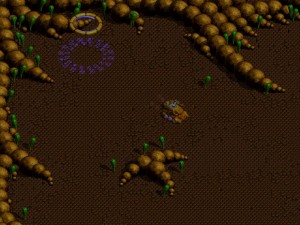Gromada: Crash Investigation
OK, I’m having technical problems with Gromada. There’s one level that consistently crashes to the desktop. It doesn’t do it immediately, and it doesn’t do it at a consistent time, but I can’t get through the level without a crash, regardless of what I do. The level does do some peculiar things that I haven’t seen happen on other maps — specifically, it involves a bunch of pre-damaged enemy tanks, and a repair center that will eventually give one of them a key as it repairs it. I can believe that this construct somehow gets into an untenable state when multiple tanks try to access it at once, or something like that. But this speculation doesn’t help me much. I don’t have a fix or a workaround.
I do, however, have an error log. It isn’t terribly informative about the problem, though. It mainly just seems to be a bunch of diagnostic print statements that got left in the release, lots of “sprite free” and “Beginner curclock=27106024” and the like. There’s one line that gives me pause, though: “SND::Can’t control CdAudio volume”. CDAudio? Is this game supposed to be playing CD music? There’s some evidence to support this. I hadn’t been getting any kind of background music during the missions; the only music I had heard in the game was a jolly jingle on winning levels. And yet, the options menu contains a music volume slider, which doesn’t seem to affect that jingle at all.
Well. I tried playing the disc in Windows Media Player, but it didn’t recognize it as having audio tracks. Perhaps my current system just doesn’t recognize audio CDs at all? It’s been quite a while since I last used one. But no, I tried one out and it worked fine. Perhaps it’s just hybrid audio/CD-ROM discs that give it trouble? It took me a while to locate a disc in my collection that I knew to be a hybrid — I know I have several, but I’ve forgotten which ones they are. The only one I could think of was Spirit of Excalibur, a game which uses CD-audio tracks for NPC speech and rather memorably starts the speech tracks with every insult to the player character in the game. Yes, a memorable game, but not a memorable name, so it still took me a while to find it. Anyway, the system handled it just fine. So unless Gromada uses some weird audio format that later operating systems don’t recognize, it looks like there aren’t any audio tracks on the disc. Perhaps the original Russian version was different. At any rate, I’m going to assume that this isn’t actually the cause of the crash.
The crash doesn’t actually stop my progress entirely. After you’re a few levels in, Gromada makes two levels available at once, and after that, three. This doesn’t seem to be a branching structure, but rather just a choice of ordering. Still, this means I could keep on playing other levels. But I’m discouraged now, and I don’t want to bother finishing any more levels until my problems are resolved. Which may never happen: this is a game with basically no web presence, and nary a patch. I’ve found a few cheat codes, but those seem to be the only words anyone has to say about it. Bethesda customer support acknowledges its existence, but only just barely.
 Comments(0)
Comments(0)